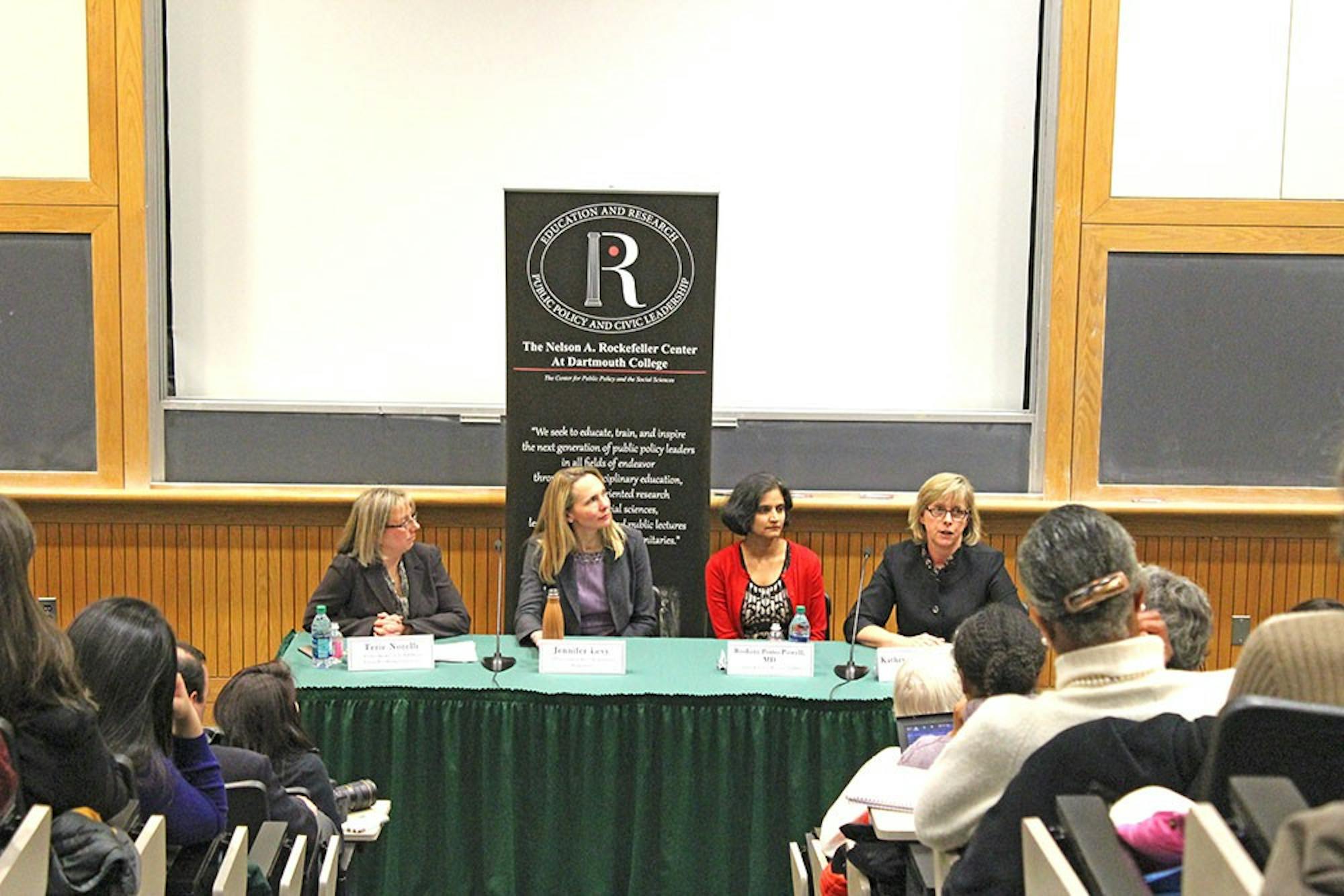Fifty people, mostly women, gathered in the Rockefeller Center yesterday evening to hear a discussion about women in leadership and the different workplace experiences women face compared to men.
The panel featured moderator Terie Norelli, former New Hampshire House of Representatives speaker, and Hypertherm vice president of corporate social responsibility Jennifer Levy, Geisel School of Medicine professor Roshini Pinto-Powell and Ledyard National Bank president and chief executive officer Kathryn Underwood as panelists.
Norelli began the discussion by quoting statistics from the “Women in the Workplace” study by management company McKinsey & Co., which showed a high gender gap in leader ship roles and that in the corporate promotional hierarchy, women are less likely than men to advance at every level and the gender gap in leadership roles is high.
She said that women get less credit for successful outcomes and are blamed more for failure. She added that there is an anti-maternal bias in the workplace, as motherhood triggers the assumption that women are less competent and committed.
Levy, Pinto-Powell and Underwood all spoke of their personal experiences of gender-based discrimination in their respective fields.
Levy said that her field, industrial manufacturing, was mostly dominated by men. While there are fair number of women in lower-level jobs, there are very few women in senior leadership, she added.
Underwood said that while 63 percent of banking employees are women, the few in management ranks are usually in human relations and marketing. In terms of supporting women at higher ranks, Underwood said that the United States is making no progress.
Norelli said that women are underrepresented throughout the corporate promotional hierarchy, especially in senior leadership positions. While women are well represented in positions that support the organization like legal, human resources and information technology, women are not well represented at every level of central positions with more core operational responsibility, Norelli said. Norelli called these roles “lines roles.” Since line roles provide types of experiences that leads to executive positions, she said women are disadvantaged in reaching higher level leadership positions.
Levy recalled from her time at an early job that while she wanted to be a positive leader in the workplace, even in her male-dominated field, she was afraid to assume a staff role because she did not want to be excluded from the promotions arising from line roles.
Pinto-Powell said the challenge in getting more women leaders is that the system of advancement is a “leaky pipeline.”
Underwood noted that part of the reason why women do not advance is that women often do not give themselves enough credit, take risks or apply for jobs until they are absolutely certain of success.
She then emphasized the importance of mentors, explaining that her mentors saw more in herself than she did.
“It’s the mentors who pulled me, pushed me and dragged me to move from one job to another,” she said.
Pinto-Powell said that the lack of support women receive and the glass ceiling women encounter are barriers less frequently faced by men.
She said that women experience an uneven playing field in the corporate world because of unconscious bias, which can negatively effect their performance. In the academic medical field, many opportunities for promotion are not available through open searches, but instead by appointment from those in higher positions, which puts women’s ability to advance at risk due to the unconscious biases of others, she said
The panelists also agreed that there are stereotypes about the way men and women lead, and as a result, women can be discriminated against in leadership positions.
Underwood said that women tend to be more collaborative and more “consensus builders” than men. She noted that from her personal experience, certain people disliked her leadership style of being more detail-oriented and focused on getting everyone on her team involved.
Pinto-Powell said people should focus more on what type of leader they want rather than shying away from women’s style of leadership.
After the discussion, an attendee asked the panel whether or not women should downplay being mothers. Pinto-Powell said that nowadays medical students and residents are warming up to the idea of having children and encouraged women to not buy into the stigma of being a mother, saying that a “career will wait.”
Another attendee asked what strategies could be employed to bring more women into leadership roles. Levy said she formed a diversity-creating council to figure out best practices. Pinto-Powell said people should educate others about stereotype threat, write positions in gender neutral terms and help other women reach leadership positions by mentoring. Underwood encouraged challenging organizations without diverse representation in workforce.
Norelli closed by saying that the takeaway is that equality for women in the workplace has come a long way, but that there is still a lot to overcome, as evidenced by how the panelists from different fields face similar biases and challenges.
After the event, Levy said she thought the panel went well and was encouraged by the enthusiasm of the audience.
Patricia Higgins, an attendee and former representative in the New Hampshire House of Representatives, said that Norelli brought together the panel well and that it was inspiring to see how the treatment of women in the workplace has changed over time.




